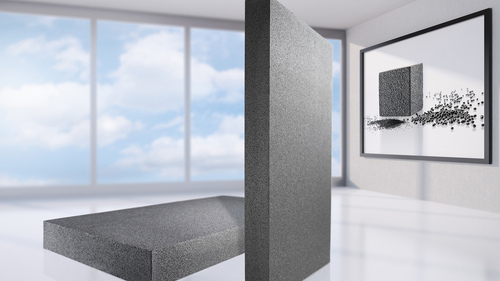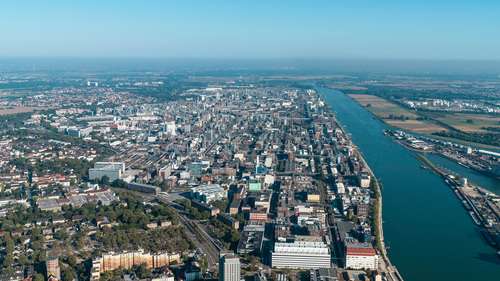BASF invests in increasing production capacity of Neopor® at Ludwigshafen, Germany
BASF is strengthening its styrene value chain at its Ludwigshafen site by expanding the production capacity of Neopor® by 50,000 metric tons per year. This increase is aimed at meeting the growing market demand for the grey insulation material. The start-up of the new production facilities is scheduled for early 2027.
Neopor® is a graphite-containing, expandable polystyrene (EPS) granulate developed by BASF, primarily used as a raw material for the production of energy-efficient insulation materials for building envelopes. The graphite contained gives the material its grey color and enhances the insulation performance of the boards by up to 30% compared to white EPS. Insulation materials made from Neopor® have set new standards in both new construction and renovation.
“Under BASF's sustainability evaluation method, TripleS (Sustainable Solution Steering), which BASF uses to evaluate all its products, Neopor® is classified as a ‘Pioneer’ in the highest category and is part of BASF's ‘Sustainable-Future Solutions’,” says Dr. Stephan Kothrade, Member of the Board of Executive Directors and Chief Technology Officer of BASF SE. “Our ambition is to be the preferred chemical company to enable our customers’ green transformation. And Neopor® is an excellent example of how we can achieve this."
Rising demand for insulation materials expected
BASF anticipates a significantly increasing demand for materials for energy-efficient building renovations in the coming years. The European Union aims to make the European building sector climate-neutral by 2050. To achieve this ambitious goal, implementing the European Energy Performance of Buildings Directive (EPBD) in all EU member states imposes high requirements for improving the energy efficiency of buildings.
"A well-insulated building envelope is essential for reducing greenhouse gas emissions and achieving climate goals. It is also a prerequisite for the sensible use of modern heating technology. Our EPS insulation materials play a significant role in this," says Dr. Klaus Ries, Head of Business Management Styrenics Europe at BASF. "Over their decades-long lifespan, they significantly reduce CO2 emissions and energy consumption for heating and cooling the building. This is beneficial not only for the climate but also saves energy costs. The graphite-containing Neopor® offers excellent insulation values, is easy to process, cost-effective, and recyclable. Neopor® is one of the most eco-efficient insulation materials."
Neopor® BMB and Neopor® McycledTM with optimized sustainability profiles
Insulation materials made from Neopor® already make a significant contribution to sustainable construction in their classic form. With Neopor® BMB and Neopor® McycledTM, BASF offers products with further optimized sustainability profiles.
Neopor® BMB has a significantly reduced CO2 footprint compared to classic Neopor®. In its production, at the beginning of the value chain fossil raw materials are replaced with a corresponding amount of renewable raw materials. The allocation of the share of renewable raw materials to the product according to a mass balance approach is independently certified by REDcert2. In the production of Neopor® F 5 McycledTM, mechanically recycled EPS waste is partially used as a raw material, thereby closing the recycling loop for EPS. Both the recycled material used and the insulation raw material are REDcert2 certified.
The use of Neopor® BMB and Neopor® McycledTM not only reduces the CO2 emissions generated during building use, but also the CO2 footprint of the building itself. At the same time, they have the same high product quality and optimized insulating effect as classic Neopor®.
Categories
Investments
2024-06-01
at BASF SE, Ludwigshafen (DE) Investment detailsCountries
Companies
Latest news
Hycamite’s technology to decarbonize shipping awarded AiP by industry leader DNV
Kokkola Industrial Park →Hycamite’s proprietary Thermo-Catalytic Decomposition (TCD) technology offers a new approach to producing clean hydrogen by breaking down methane, the primary component of liquefied natural gas (LN...
Clariant catalysts will power the Ecoplanta: Europe's first waste-to-methanol plant
Chemmed Cluster Tarragona →Repsol is building Europe’s first plant to produce renewable methanol from urban waste The facility will use Enerkem gasification technology to produce 240 KTA of methanol Clariant will supply cata...
Lilly plans to build a new $3 billion facility to boost oral medicine manufacturing capacity in Europe for patients worldwide
Netherlands site will bring 500 manufacturing and 1,500 construction jobs while further strengthening Lilly's global supply chain
Ports of Duisburg and Rotterdam advance energy transition together
Port of Rotterdam →With this LoI, the two major European logistics hubs reinforce their goal of jointly developing sustainable transport corridors via waterways as well as future-oriented initiatives for the energy t...


